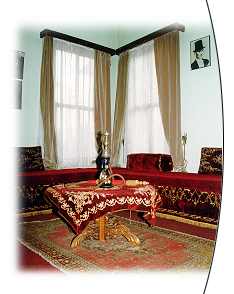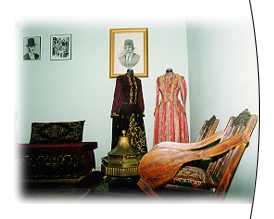Adana - Atatürk Museum
 The museum building is one of the traditional Adana houses on Seyhan Avenue, built in 19th Century. A two-storey structure built of brick and stone with bay windows and pitch roof. Because of its peculiar characteristics, it is classified as “Cultural Real Estate under Conservation” by the Ministry and preserved in its original state. When Atatürk and his wife visited Adana on 15 March 1923 they stayed in this house which belonged to Suphi Pasha of Ramazanogullari at the time. The building was expropriated and restored by the “Atatürk Scientific and Cultural Conservation and Revival Society” and under the guidance of Army Corps commander Bedrettin Demirel and by the people’s help and donations, opened to public as a museum in 1981 under the administration of Directorate of Museums.
The museum building is one of the traditional Adana houses on Seyhan Avenue, built in 19th Century. A two-storey structure built of brick and stone with bay windows and pitch roof. Because of its peculiar characteristics, it is classified as “Cultural Real Estate under Conservation” by the Ministry and preserved in its original state. When Atatürk and his wife visited Adana on 15 March 1923 they stayed in this house which belonged to Suphi Pasha of Ramazanogullari at the time. The building was expropriated and restored by the “Atatürk Scientific and Cultural Conservation and Revival Society” and under the guidance of Army Corps commander Bedrettin Demirel and by the people’s help and donations, opened to public as a museum in 1981 under the administration of Directorate of Museums.
Atatürk’s visit to Adana is officially celebrated every year on the 15th March in this building.
Ground Floor
Study Room: The newspapers “Yeni Adana”, “Türk Sözü”, “Cukurova” and Dirlik which were published during and after the Independence War, are displayed in this section.
Library: Nearly two thousand books, written in Ottoman (Arabic alphabet) and Turkish (Latin alphabet) are on display. Most of the books are obtained by donations.
Upper Floor
Anteroom: Atatürk’s wax statue was made by retired officer Nevzat Duruak and is exhibited in this room.
Bedroom: Atatürk’s brass bedstead, silver threaded quilt and table cloth, traditional Maras style two armchairs and a wardrobe are exhibited in this room.
Study Room: An armchair, table and chairs, telephone, cupboard and Atatürk’s portrait are in this room.
Press Room: There are bound volumes of “Yeni Adana” newspaper in a showcase and framed photos of the newspaper staff in this room.
Warrior’s Room: The portraits of Gani Girici and his fellow warriors, Gani Girici’s medal of honour and a clock stopped at 9.05 in memory of Atatürk's time of death are on display in this room.
Lounge Room: Walnut chair, narghile, metal brazier, kilims and rugs are exhibited in this section. 
Hatay Room: During Atatürk’s visit to Adana an envoy from French occupied Hatay headed by Ayse Fitnat Hanim had been received by Atatürk and presented him with black roses. Atatürk’s response to that gesture was “Centuries old Turkish land will not be allowed to be held by the enemy”. There are mannequins to depict this event. Also, in this room an engraved walnut coffee table, Turkish flag and various photos of the members of the envoy are on display.
Armoury: Various types and calibers of rifles, pistols, generals’ epaulets, a model of the house where Atatürk was born, a sample of the stone from Osmaniye which was used in Atatürk’s tomb in Anitkabir and also some collections of antique coins in a showcase are displayed in this room.
Adjutant’s Room: In Atatürk’s Adjutant’s room brass bedstead, silver threaded quilt, a walnut overlayed wardrobe, metal bowl and ewer are on display.
Kuva-i Milliye Room: The busts of Atatürk, Ismet Inönü and other members of Kuva-i Milliye who initiated the movement and people distinguished with their efforts during that period are in this room.
Atatürk Museum, except Mondays, is open all days of the week.